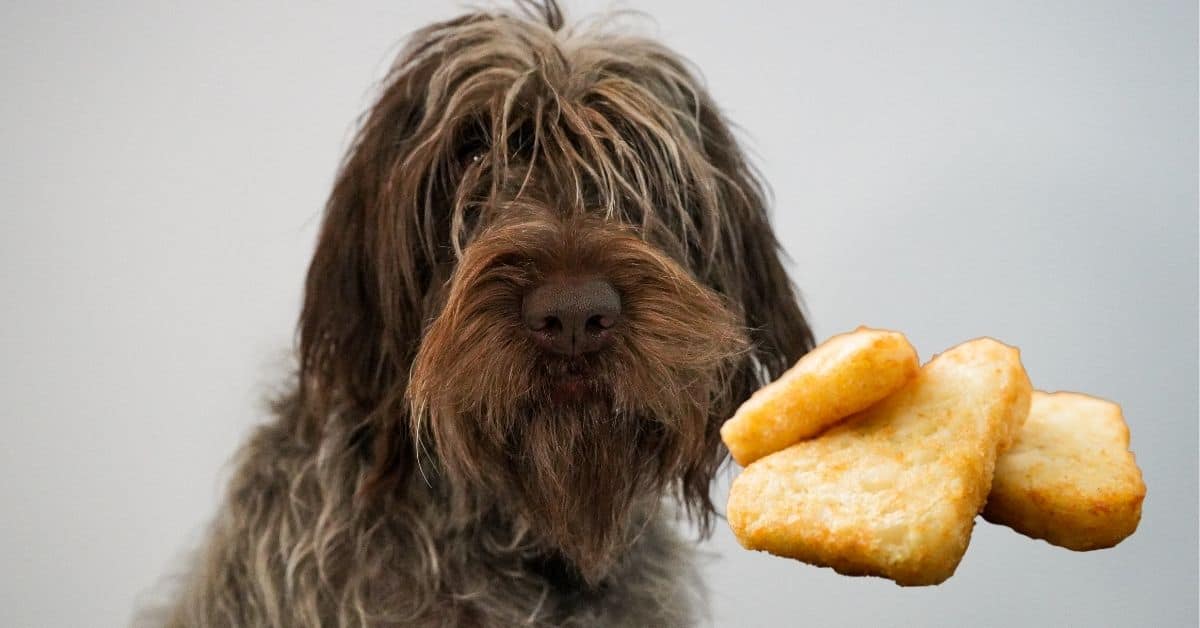We all know how alluring it may be, especially when your dog gives you those puppy dog eyes, to offer them a delectable treat off your plate.
Hash browns fall into the category of foods that dogs shouldn’t eat regularly as they are a lot of what we eat.
This blog post will explain why hash brown potatoes aren’t the best for a dog’s diet, particularly those from McDonald’s.
But first, let me give you a timely response.
Can dogs eat hash browns?
Dogs shouldn’t eat hash browns.
McDonald’s is particularly loaded with salt, unhealthy fats, and preservatives.
Additionally, some hash browns are prepared with onion, poisonous to dogs, and then fried in oils, giving them a high-calorie content.
What about Subway hash browns?
You probably won’t be surprised to learn that your dog should avoid Subway hash browns.
These hash browns are incredibly calorie-dense and rich in salt and saturated fat.
Homemade, fast-food, or frozen hash browns are not safe additions to your dog’s diet.
Instead, offer your dog nutritious dog food or treats.
Symptoms to look for if my dog ate hash browns If you’re panicking because you’ve been feeding your dog hash browns in the past completely unaware, it’s okay!
Take a breath and keep reading.
Ingredients Of Hash Browns
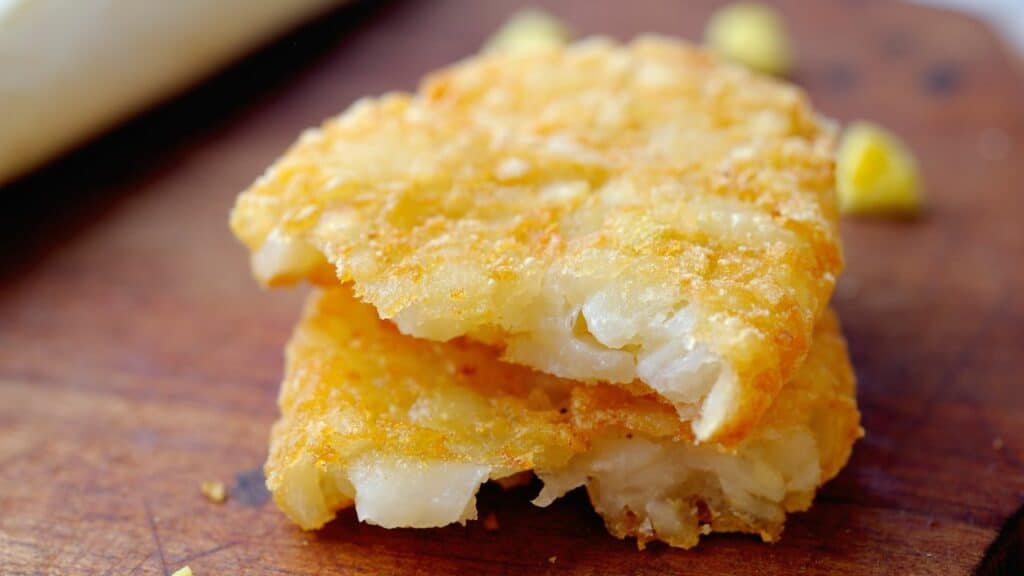
Hash browns are flavorful, savory, and crisp because they are made with various ingredients that appeal to the human palate.
Let’s discuss the components of the hash browns from McDonald’s and those purchased from a store, such as the Trader Joe’s hash brown patties.
Potatoes
Oils
Vegetable oil, canola oil
Soybean oil
Corn oil
Hydrogenated soybean oil
Natural beef flavor
Citric acid
Dimethylpolysiloxane
Salt
Corn flour
Dehydrated potato
Dextrose (corn sugar or sweetener)
Sodium acid pyrophosphate
Extractives of black pepper
Reasons Why Hash Browns Are Bad For Dogs
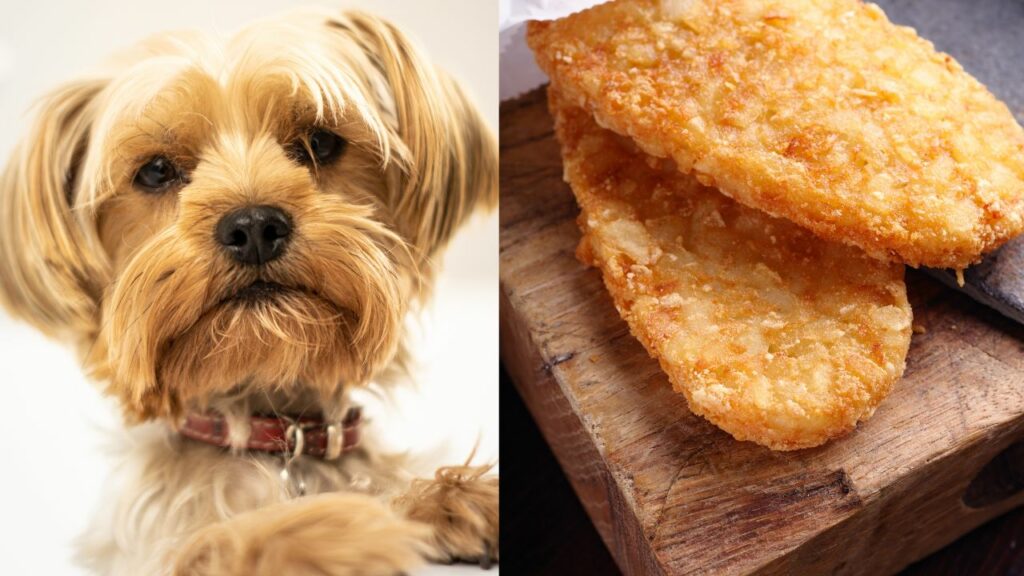
They are merely delicious tiny patties of fried potatoes, after all.
What is it about these occasional dog treats that are so dangerous? It turns out a lot.
Three things pose the greatest threat:
Deep frying
Ingredients in the patties
Seasonings
They Are Fried
The first is deep frying for a purpose! Anything cooked in oil will be terrible for a dog’s digestive system.
The saturation of salt and bad fat in hash browns is made worse by using fatty oils during the cooking process.
Dogs enjoy the taste of deep-fried food, but it doesn’t reciprocate.
It may both short- and long-term harm their health.
Later, more on that!
Some Ingredients
Hash browns are mixed potato mince, in our opinion.
However, hash brown patties include additional ingredients like rice, eggs, and oil to help bind everything together.
They can put your dog at risk, mainly if he is prone to food sensitivities.
Additionally, potatoes contain solanine, which is hazardous to some canines.
This particular point should be acceptable in moderation.
A lot Of Seasoning
The specifics come into play when it comes to seasonings and spices.
More than 90% of hash brown recipes involve seasonings, and many incorporate onions.
It’s okay if you weren’t aware of this since these are frequently not explicitly included in the ingredients!
Onion spice is quite harmful to dogs, though.
When combined with other ingredients like garlic and too much salt, it can potentially be fatal.
Onion
All components of the onion plant, including the flesh, leaves, juice, and processed powders, are poisonous to dogs.
All members of the allium family, including onions, garlic, shallots, leeks, and chives, are toxic to dogs in any form, including raw, cooked, dried, and powdered.
Dextrose
One of the critical components of hash browns is dextrose.
Typically, it is a sweetener or corn sugar.
All ingredients are sugar, whether they are labeled as dextrose, corn sugar, or sweetener.
Our animal pals don’t need any sugar at all in their diets.
They don’t even need to eat sugar because their body spontaneously turns the carbs in their usual food into sugar.
Dogs who overeat sugar risk developing pancreatitis, diabetes, dental problems, and weight gain.
The best action is to keep our animal pals away from human food containing any sugar. Also, watch out for sweeteners.
Xylitol and other sweeteners are poisonous and hazardous to dogs.
A Lot Of Salt
Hash browns have a lot of salt in them.
Although this gives them flavor and taste, eating food with a lot of salt is hazardous to dogs and may cause salt poisoning.
Salt poisoning in dogs manifests as:
Diarrhea
Vomiting
Seizure
Muscle tremors
Weakness
Dehydration.
It’s recommended to keep pets from consuming too much salt.
Contact your veterinarian immediately and take your dog in for treatment if he has salt poisoning.
High In Calories
As you can see, hash browns contain a lot of calories.
Keep in mind that dogs only require about 25 calories per pound daily. For example:
Only 250 calories should be consumed daily by a small breed dog weighing 10 pounds.
No more than 1,250 calories per day should be consumed by a medium-sized dog weighing 50 pounds.
Only 1,750 calories should be consumed daily by a large breed dog weighing 70 pounds.
Only 2,250 calories should be consumed daily by a 90-pound gigantic breed.
By the 90/10 guideline, treats should make up no more than 10% of a dog’s daily diet.
Occasional Potato Treats for Dogs
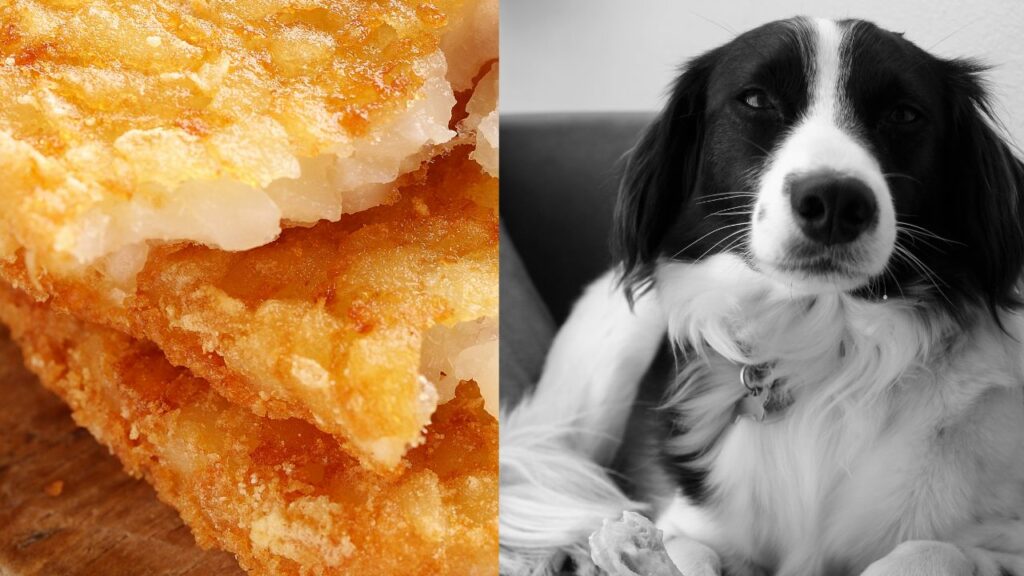
You must curb your dog’s demand for hash browns if it happens due to your late-night munching.
Second, you should make a few considerations if you occasionally give your dog potatoes or hash browns.
Always keep the dog away from the potato stem, skin, and leaves.
There can be disastrous repercussions if your dog accidentally eats potato peel.
As we previously established, potatoes have a lot of solanine in their skin.
Due to this, your beloved pet may experience clouded vision, tummy trouble, and even cardiac problems.
Therefore, if you wish to give your dog potatoes, provide them in moderation.
What Happens If A Dog Eats Hash Browns?
The solanine content of potatoes diminishes upon complete cooking.
Hash browns, potato skins, leaves, or stems can cause your dog to become unwell and show symptoms, including vomiting, diarrhea, poisoning, blurred eyesight, stomach discomfort, and slowed heartbeat.
They must be taken right away to a veterinarian.
Most dogs experience no side effects from a small amount of hash brown.
You shouldn’t feed your dog the hash brown potato again if you see any changes after they’ve eaten it.
Symptoms of food poisoning include:
Decreased appetite
Diarrhea
Excessive thirst
Increased urination
Lethargy
Seizures
Vomiting
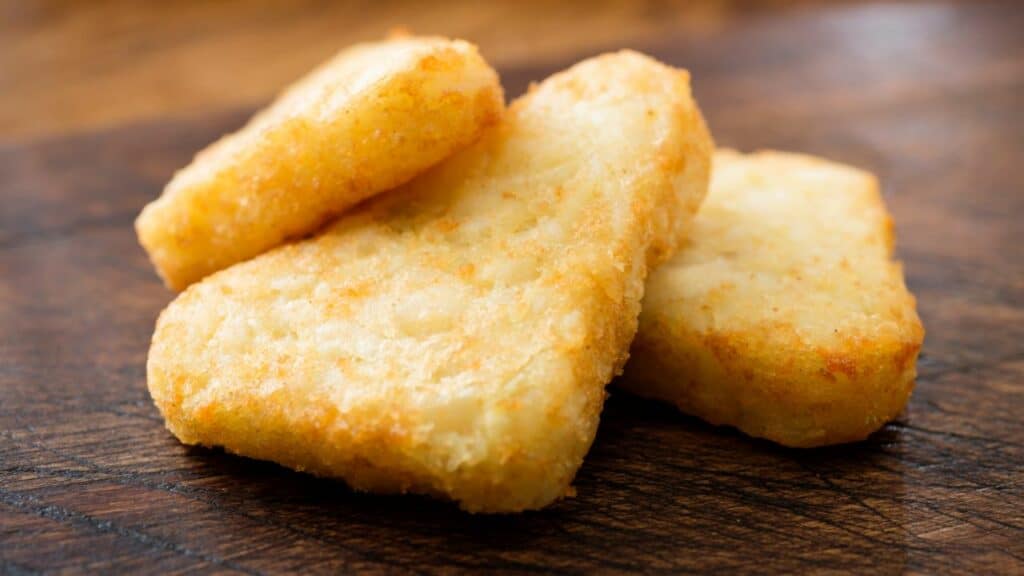
Can Hash Browns Be Toxic To Dogs?
Salt poisoning must be taken carefully since it might be lethal to your dog.
If your dog consumes more salt than is necessary, it may negatively impact its health.
Salt depletes muscles when taken in excess, and weak muscles make dogs struggle to walk.
The most typical signs of salt poisoning are thirst and frequent urination.
Your dog is lowering his blood salt level and endangering his pet’s life when he drinks water and urinates regularly.
Hash browns are great treats for dogs since they are salty.
Small breed dogs can also become poisoned by small amounts of salt, whereas giant breed dogs require significant amounts of salt to become poisoned.
My Dog Ate A Lot Of Hash Browns – What Should I Do?
Fortunately, since potatoes make up most of the ingredients in hash browns, they should be fine if your dog slips in a small bite.
Just keep a watch out for any negative signs or effects.
However, don’t hesitate to contact your veterinarian immediately if your dog has had a lot of hash brown potatoes and you observe a behavior change.
It is advised to call your veterinarian if you find that your dog has had a large number of hash browns.
Depending on their symptoms and medical background, your dog can require medical attention and a medical evaluation.
And watch out for signs of onion and sodium toxicity.
The following are symptoms of food, onion, or salt poisoning:
Decreased appetite
Diarrhea
Excessive thirst
Increased urination
Lethargy
Seizures
Vomiting
When You Need To Call A Vet
If you see any of the symptoms listed above, you can call your veterinarian immediately or decide to wait it out and see how things go since he is your dog.
However, if he exhibits any of the following indicators, you should take him to the veterinarian right away:
Seizures or uncontrollable shaking
Loss of consciousness
Extreme lethargy
Repeated vomiting and diarrhea
These symptoms could be a sign of salt poisoning, which can be lethal to dogs.
To keep him secure, you must act fast and take him to the doctor.
Conclusion: Can Dogs Eat Hash Browns?
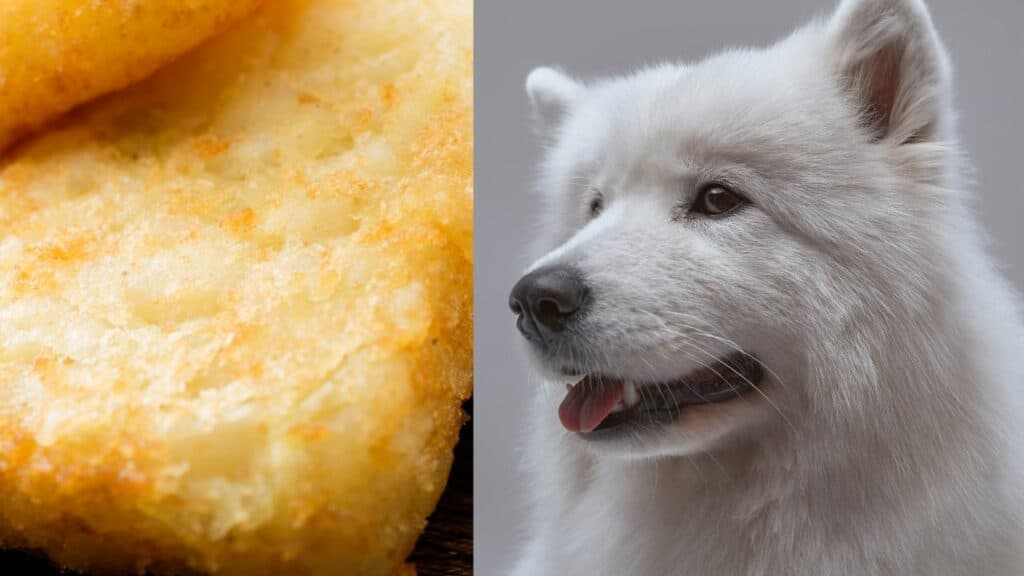
As you know now, dogs can not eat hash browns.
Hash browns are loaded with salt, unhealthy fats, and preservatives.
Also, avoid showing your dog hash browns for every meal, and don’t leave them somewhere your dog can access them.
Since your dog requires other vital nutrients to survive in addition to one meal, this shouldn’t make up most of its calorie intake.
Always consult your vet before letting your dog eat hash browns or any other food made for human consumption.
Before You Go…
Now you know the answer to the question, “Can dogs eat hash browns?”.
If you want to learn more, read the following articles too!

